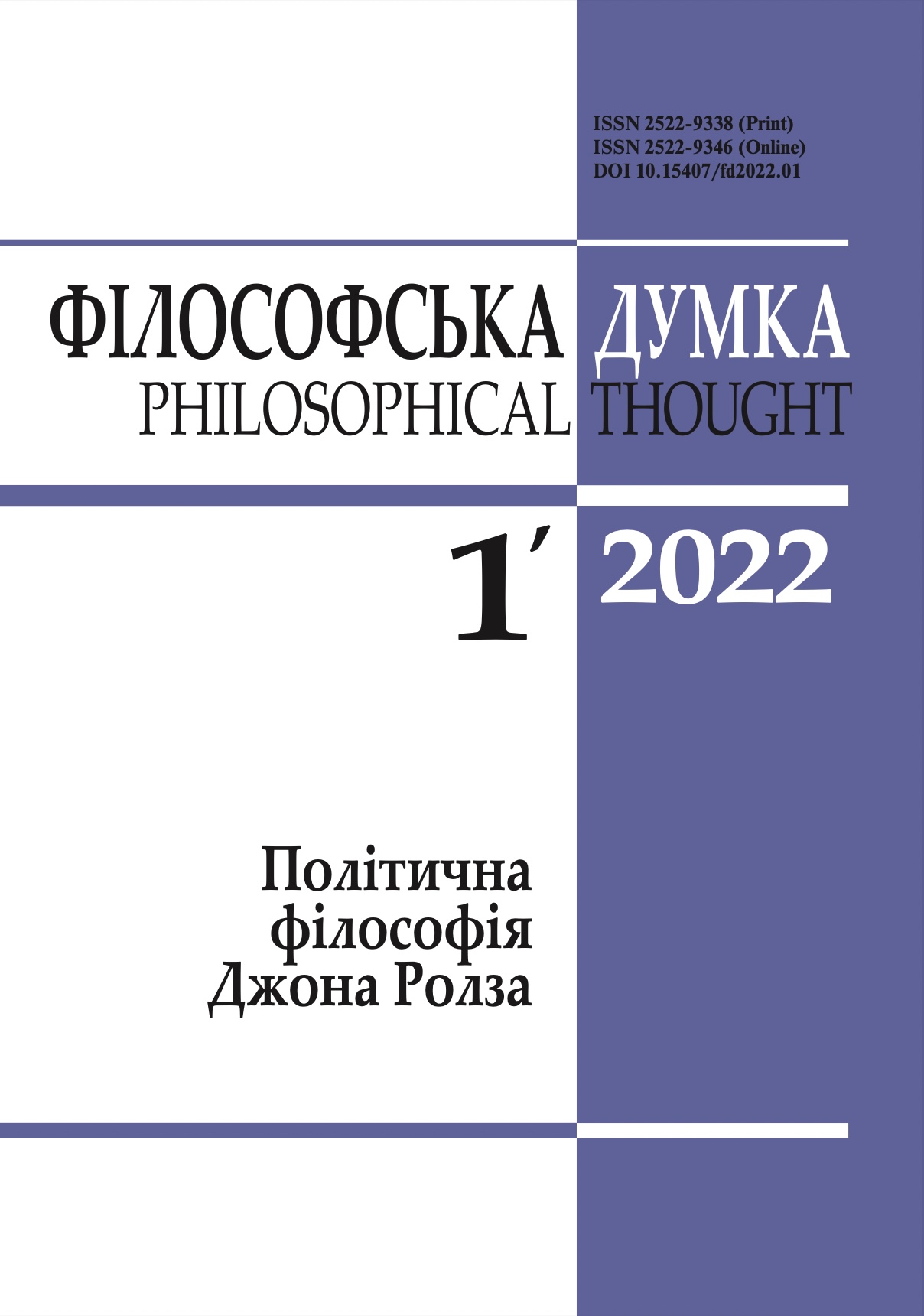Overlapping consensus in the space of public morality (on John Rawls’s political constructivism)
JOHN RAWLS’S POLITICAL PHILOSOPHY
DOI:
https://doi.org/10.15407/fd2022.01.051Keywords:
overlapping consensus, well-ordered society, public morality, background culture, moral minimalismAbstract
The article is focused on the overlapping consensus model in the space of public morality and possibilities of its practical realization for the development of public consent. In his search for reliable arrangement of public unity John Rawls defines comprehensive moral doctrines and political doctrines as beliefs within private and public spheres, respectively. Overlapping consensus provides public consent in the public space (concerning political doctrines), beyond beliefs of private sphere (comprehensive moral doctrines). Moral values of overlapping consensus form the sphere of public morality, effective in definite historic democratic society. Rawls called it a well-ordered society. Definite historic character of a well-ordered society is predetermined by corresponding background culture. The latter can be implied as the experience of citizenship, conditioned by peculiarities of social insti- tutions of Modernity. It is immediate immanent axiological accompaniment of the public life, background one concerning explicit ethical normative programs and strategies of acting by individuals in public life, directed on optimization of public interaction. Moral values within overlapping consensus are minimalistic (because of their set able to unite all mem- bers of a society is the basic one for all of them, irrespectively to their comprehensive moral doctrines, i.e. poor in content, laconic one), contextual (module/ flexible, relevant to public spiritual requests, transforming during the search for integrity minimum) and uni- versal in their imperative power. Overlapping consensus makes impossible transformation of any comprehensive moral doctrine into the regulative idea of public life and set formal horizontal social interaction, which is corrected in real time mode.
References
Beck, U. (2000). The Cosmopolitan Perspective: Sociology of the second Age of Modernity. Bri- tish Journal of Sociology, 51 (1), 79-105.
https://doi.org/10.1080/000713100358444
Berlin, I. (2009). Two Concepts of Liberty. [In Ukrainian]. In: Liberalism. Anthology. / Ed. by O. Protsenko, V. Lisovyi (pp. 546-583). Kyiv: Prostir, Smoloskyp.
Forst, R. (2002). Contexts of Justice: Political Philosophy beyond Liberalism and Communitarianism /Tr. by M.M. Farrell. Berkley, Los Angeles, CA, London: University of California Press. Gellner, E. (1995). Conditions of Liberty. Civil Society and Its Rivals. [In Russian]. Moscow: Ad Marginem.
Gray, J. (2003). Enlightenment's Wake: Politics and Culture at the Close of the Modern Age. [In Russian]. Moscow: Praksis.
https://doi.org/10.4324/9780203450635
Iliinskaia, S.G. (2009). Conditions of tolerance in structure of public morals. [In Russian]. In: Public Morality: Philosophic, Normative Ethical and Applied Problems / Ed/ by R. Apressian (pp. 241-256). Moscow: Alfa-M.
Kashnikov, B. (2009). Pragmatic of Public Morality. [In Russian]. In: Public Morality: Philosophic, Normative Ethical and Applied Problems / Ed. by R. Apresian (pp. 137-154). Moscow: Alfa-M.
Krotiuk, S.F. (2007). European Integration: Success and Problems (on 50th anniversary of the European Economic Community). [In Ukrainian]. In: Kyiv International University Herald: International Relations, 5, 28-37.
O'Neill, O. (2003). Constructivism in Rawls and Kant. In: The Cambridge Companion to Rawls / Ed. by S. Freeman (pp. 347-467). Cambridge: Cambridge University Press.
https://doi.org/10.1017/CCOL0521651670.010
Putnam, R.D. (2000). Bowling Alone: The Collapse and Revival of American Community. New York, London, Toronto: Simon & Schuster.
https://doi.org/10.1145/358916.361990
Rohozha, M. (2009a). Public Morality: Collisions of Minimalism. [In Ukrainian]. Kyiv: PARAPAN.
Rohozha, M. (2009b). The Saving of Danish Jews in 1943. Socio-Ethical Case. In: Public Mora- lity: Philosophic, Normative Ethical and Applied Problems. Ed. by R. Apresian (pp. 397- 423). Moscow: Alfa-M.
Rawls, J. (1987). The Idea of an Overlapping Consensus. Oxford Journal of Legal Studies, 7 (1), 1-25.
https://doi.org/10.1093/ojls/7.1.1
Rawls, J. (2000). Political Liberalism. [In Ukrainian]. Kyiv: Osnovy.
Rawls, J. (2001). A Theory of Justice. [In Ukrainian]. Kyiv: Osnovy.
Rawls, J. (2009). Justice as Fairness: Political, not Metaphysical / Tr. by V. Lisovyi. [In Ukrainian].
In: Liberalism. Anthology / Ed. by O. Protsenko, V. Lisovyi (pp. 801-824). Kyiv: Prostir, Smoloskyp.
Schmitt, C. (2006). The Leviathan in the State Theory of Thomas Hobbes. [In Russian]. S.-Petersburg: Vladimir Dal'.
Walzer, M. (2000). On Toleration. [In Russian]. Moscow: Ideia-Press, Dom intellektual'noi knigi.
Walzer, M. (1994). Moral Minimalism. In: M. Walzer, Thick and Thin: Moral Argument of Home and Abroad (pp. 1-19). Notre Dame: University of Notre Dame Press.
Downloads
-
PDF (Українська)
Downloads: 301
Published
How to Cite
Issue
Section
License
Authors who publish with this journal agree to the following terms:
- Authors retain copyright and grant the journal right of first publication.
- Authors are able to enter into separate, additional contractual arrangements for the non-exclusive distribution of the journal's published version of the work (e.g., post it to an institutional repository or publish it in a book), with an acknowledgement of its initial publication in this journal.
- Authors are permitted and encouraged to post their work online (e.g., in institutional repositories or on their website) prior to and during the submission process, as it can lead to productive exchanges, as well as earlier and greater citation of published work (See The Effect of Open Access).


